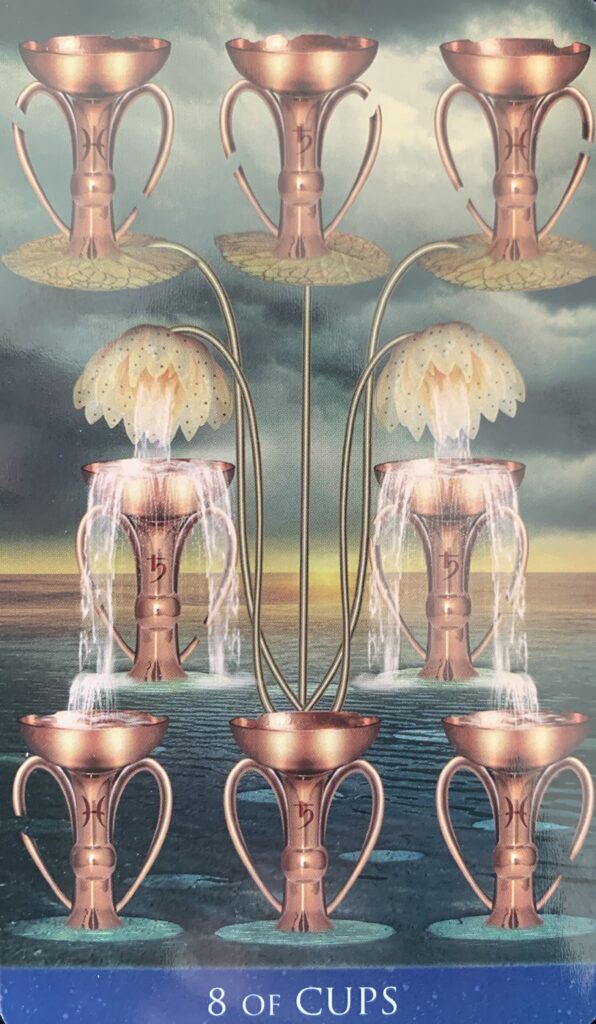
In The Millennium Thoth Tarot Created by Renata Lechner
Interpreted by Marv Machura
The Five-Card Pentagram Tarot
On this card, there are eight bronze cups arranged against a cloudy, somewhat dark, and watery background. The bronze cups are gleaming with various degrees of light, and each one is damaged in some minor way that can be seen when closely examining each one.
Bronze is a metal allow of copper and tin. Bronze is perhaps the oldest alloy in our known, recent human history. After its invention, bronze became such a widely used and durable commodity that this metal alloy became a way to define a long and storied period that we know as The Bronze Age: approximately 4000‑1500 BCE. This age predicates The Iron Age, a time period known for the widespread use of this newer and stronger alloy: iron.
Bronze is a metal of forgiveness and health. It is an unassuming metal: useful, relatively inexpensive, and durable. It is a metal alloy that gives healing vibrations and humility to us when we wear or possess it. Bronze is good metal to have in our kitchens; it is full of the simple and good vibrations that support our fundamental, straightforward needs. For example, in our kitchens, bronze directly enhances the emotional comforts of home and hearth.
The bronze cups pictured on this card represent these unsophisticated and basic aspects of our emotional life that are needing attention. It is time to stop feeling sorry for ourself, forgive others whom we are blaming for our situation, and see that our life, while not filled with golden cups overflowing with the best wine, is essentially okay.
Eight is also the number of transitions; this reinforces the direction provided by this card. As we take responsibility for our happiness, many blessing will be coming our way. There is a reason for our emotional bleakness, and that is, if properly interpreted, to make us more aware of our responsibility for our own emotional wellness. Wehave to forgive. We have to give thanks. We have to smile. And we do not want this any other way. We do not want our happiness to depend on anyone but ourselves.
Each of the eight bronze cups is unique with its own flaws, representing and reminding us of own uniqueness and imperfections. It is our imperfections, after all, that make us humble, kind, and accepting rather than vain, mean, and unyielding. In this way, we can also see how acceptance of our imperfections makes us truly beautiful—and real beauty always comes from within.
Bronze alters and chalices are often used by people to help bring forgiveness, grace, and humility to worship services and communion with the Universe. The cups on this card could all be used as a chalice in such humble and ordinary, yet ironically deeply powerful, experiences. It will assist with the ceremony’s intentional veneration of our life and our spirit. The fact that these cups have heart-shaped handles reinforces this meaning and direct connection to our inner emotional, spiritual, and mental life.
Seven of these cup handles are broken, missing one or two segments, but are still functional. This shows how our hearts get broken, but can still carry on in spite of those missing segments.
We have to accept that life is like this. As we journey forward, pieces of our heart will be taken away, but our hearts will still be capable of loving as well as keeping us alive, pumping both blood and life force. Thus, we can see our human hearts reflected in these bronze handles which, although broken, are still useable and still beautiful in spite of the damages and missing, broken bits.
One bronze cup in the center of the bottom row is complete, with no missing segments. From behind this perfect cup, five bronze pipes rise upward. Two of these pipes appear to be pumping water into a couple of white lotus flowers above the two cups in the middle row. These lily blossoms are showering life‑giving water into these two cups, and the two cups are overflowing with sparkling water.
Notice how abundant water is filling the two cups on the outer sides of the bottom row? This reaffirms the imperative message of this card that all is not lost. Hope and happiness can be found even in times of trouble and emotional vacancy. We can move forward being more mature, more stable, more humble, and more resilient, just like bronze itself, once we stop feeling sorry for ourselves, count our blessings, and take personal control of our emotional lives.
The two white lotus blossoms gleam and glow with light. The white lotus flower has extensive symbolic meanings and associations. The most common of these symbolic associations are mental and spiritual purity, grace, and perfection. The white lotus is also representative of control over and pacification of the meaner or angrier parts of our nature. The white lotus has the power to restore us to a more whole and happy state when our emotional lives are being clouded by the darkness of self-pity, resentment, emptiness, and negativity.
We can also see this theme of resetting our emotional view of life to being kinder, less dark, and wholesome in the background imagery in this card. At first glance, this background appears dark, stormy, and cloudy. But on second glace, we see that light is breaking through the clouds and golden sun is glowing on the horizon. When our new, and sunnier, view looks again at the bronze cups, we see that they are shining rather than being dull and grey. This reminds us of the old adage that we do not see the world the way the world is; we see the world the way we are.
Three bronze pipes also rise from this bottom central cup as if to directly feed/water the green lily pads on which the empty, cups sit in the top row of cups. Lily pads are able to grow in the most foul and muddy water and as such, lily pads represent resilience, rebirth, and resurrection.
In nature, these plants act as water purifiers to the ecosystem and build, maintain habitat for many species, providing food, shelter, and beauty in otherwise bleak and lifeless environments. These humble lily pads pictured on this card, while somewhat damaged and dry, are still green and alive, ready to continue to grow and reproduce when the dark times pass, and the sun returns to amplify their metabolism.
Four of the bronze cups have the engraved symbol of Pisces and the other four are imprinted with Saturn. Pisces is the symbol of inner and individual spirituality; this reinforces the message in the 8 of Cups: go inward into our own heart to search for meaning and happiness. Pisces people are not the type to blindly worship or follow anything or anyone. They are independent seekers of truth. They are rightly skeptical of anyone claiming to have the answers. Although they may seem arrogant and unyielding, they are really just deep‑divers into the bottomless waters of our humanity.
It is appropriate that the Pisces symbols are on the outside cups, seeming to contain or frame the cups with Saturn’s symbol since Saturn is associated with stubbornness and obstinacy. This arrangement suggests a balance between Saturn’s strength of conviction and Pisces deeply‑seated mystery. Together these two forces are able to look inward, solve problems, and carry on with the necessary certainty, strength, and will power to keep our inner self and emotional life in our own firm control—and not in the control of anything or anyone else.
The number 8 is also representative of inner stability and equilibrium. This number is saying that we need to clear our minds and hearts of unnecessary and harmful elements before we can advance as the spiritual beings that we are.
We also need to take direct, personal responsibly for our feelings and emotions that can and will bog down our spiritual journey toward Heaven. This number 8 reminds us that this type of personal awareness and responsibly is one of the first required steps in discovering and enhancing our dynamic spiritual growth. Finally, this number may remind us that our spiritual growth and increasing maturity is a major part of and reason for our lives on this planet.
The 8 of Cups is here to assure us that our lives will soon be full of confidence, strength, and spiritual enlightenment. This card reminds us that there is no possible growth without struggle. And this struggle to be master of our own inner life is one of the most fundamental and vital struggles we face on our way to higher and happier ground.

